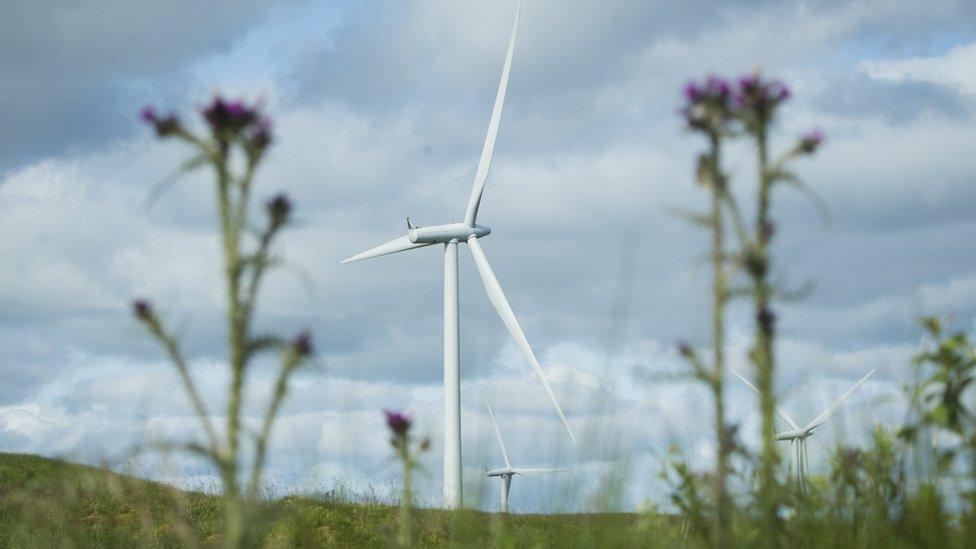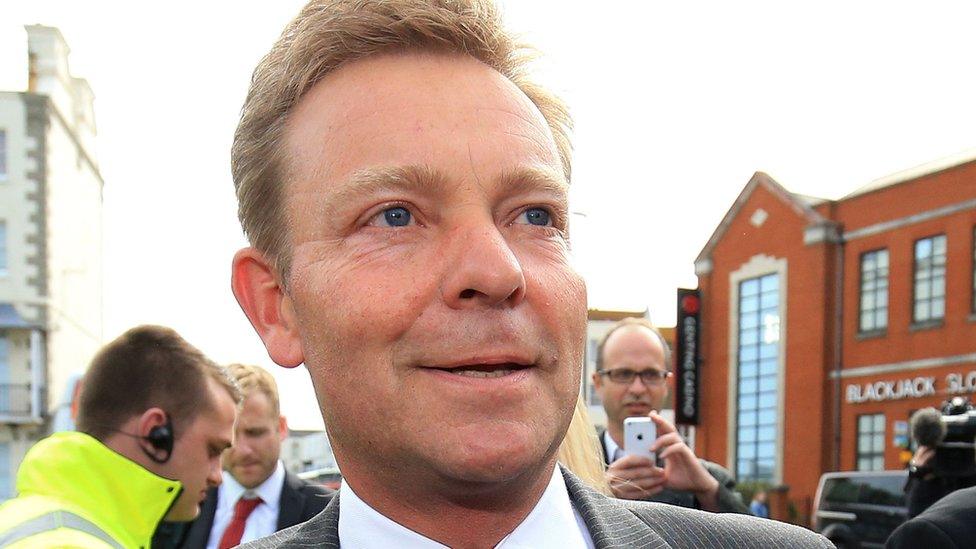Tories call on Treasury to fund green energy plans
- Published

A number of green energy products are funded through charges on consumers' bills
A group of green-minded Tory MPs says the government should fund environmental and social energy policies from the Treasury, instead of from consumer bills.
The Conservative Environment Network (CEN), which includes 116 MPs, says the temporary measure would ease the surge in household costs.
But the group opposes a separate proposal to abolish the 5% VAT on energy bills, saying it would effectively provide a subsidy for fossil fuels.
The CEN is urging ministers to reduce bills and emissions in the long term by ensuring the UK's homes are better insulated.
The plea is endorsed by the Energy Efficiency Infrastructure Group - an alliance of businesses and charities who will write to the prime minister on Monday, arguing better insulation for people in sub-standard housing could cut bills by £500 a year.
But the current crisis over energy bills has revealed divisions among Conservative backbenchers.
Energy market 'madness'
The plan to scrap VAT on energy has been pushed by the Net Zero Scrutiny Group (NZSG) of Tory MPs and peers.
The caucus, with around 20 followers, has been linked to the anti-green pressure group formerly known as the Global Warming Policy Forum, external, which was founded by the former Chancellor Nigel Lawson.
Although its numbers are small, it is well connected in Conservative media.
Its leader, the Tory MP for South Thanet, Craig Mackinlay has regularly voted against measures to tackle climate change.
He doesn't deny climate change science, but believes the costs of climate policies are falling unfairly on the UK.
In December, Mr Mackinlay tweeted that he blamed "the rush to Net Zero" for creating the "madness in the energy market".
But this view is disputed by the industry body Energy UK, which says the rise in gas prices has caused the crisis, not Net Zero policies.

Craig Mackinlay leads the Net Zero Scrutiny Group of Tory MPs and peers
Sam Hall, director of the environmental CEN, pointed out that his organisation had almost six times more members than the sceptic NZSG.
He told BBC News: "A clear majority of Conservative backbenchers supports the government's Net Zero agenda - the PM should know that we've got his back."
The director added: "Last year, no Conservative MP voted against the government's sixth carbon budget, which aims to cut emissions by 78% by 2035.
"Although a small minority of MPs are raising concerns about the cost of achieving the target, it is perfectly possible to deliver Net Zero in a way that is fair and keeps down energy costs for consumers and businesses."
Mr Hall insisted the solution to the global gas crisis "was not to deepen our dependence on gas by removing VAT".
Instead, he said the Treasury must urgently devise policies to fund environmental and social energy projects for the long term.
The government has accepted that its current system of loading levies onto the cleaner fuel - namely electricity - is perverse.
Mr Hall said when the price of gas settles, the levies should be shifted on to the dirtier home heating fuel, gas.
"Because of the government's Net Zero policy, the UK is set to reduce its gas demand significantly over coming decades," he said.
"This will protect UK consumers from future gas price shocks by making us less dependent on volatile international gas prices."
'UK should move first'
But Mr Mackinlay told BBC News he did not see any "conflict" between his group and the CEN, "nor anything to be gained by an 'ours are bigger than yours' approach".
He added: "We all want to leave the planet in a better place than we found it.
"The key difference is our perception of how best to achieve a lower carbon UK and to inject some realism when the UK is responsible for 1% of global CO2 whilst China, India, Indonesia go gangbusters for new coal."
Mr Hall said: "Every country will need to hit Net Zero - and the UK should lead on this to gain the benefit of going first to develop new technology and services."
The government is urgently seeking solutions for the cost of living crisis, which is seeing bills and price tags rising in the UK.
The idea of targeted financial support for fuel bills - along the lines of the current Warm Homes Discount scheme - is emerging as a frontrunner to tackle a cost of living squeeze, which could see households £1,200 a year worse off as a higher energy cap comes in at whilst taxes rise for workers and employers.
Follow Roger on Twitter @rharrabin